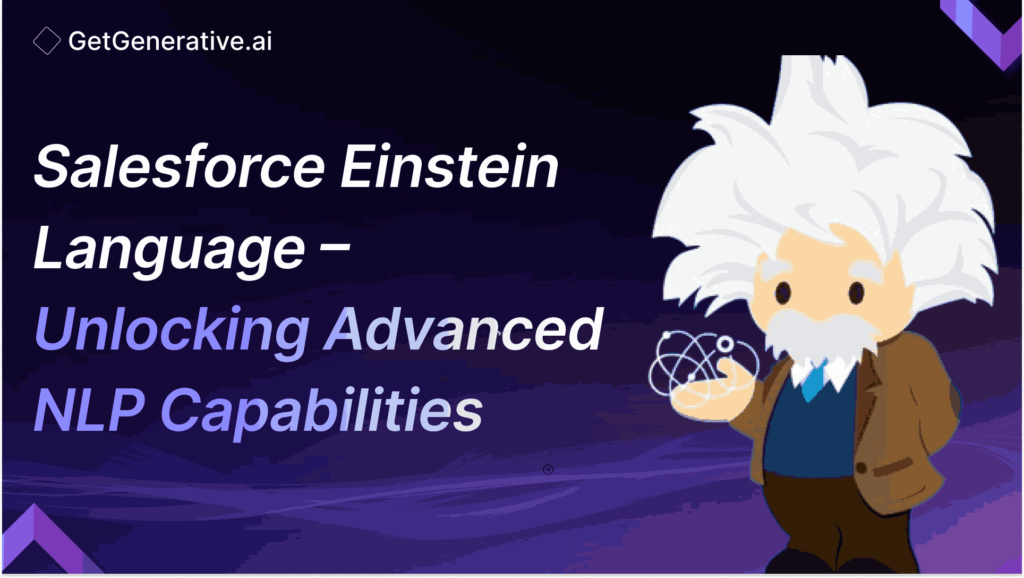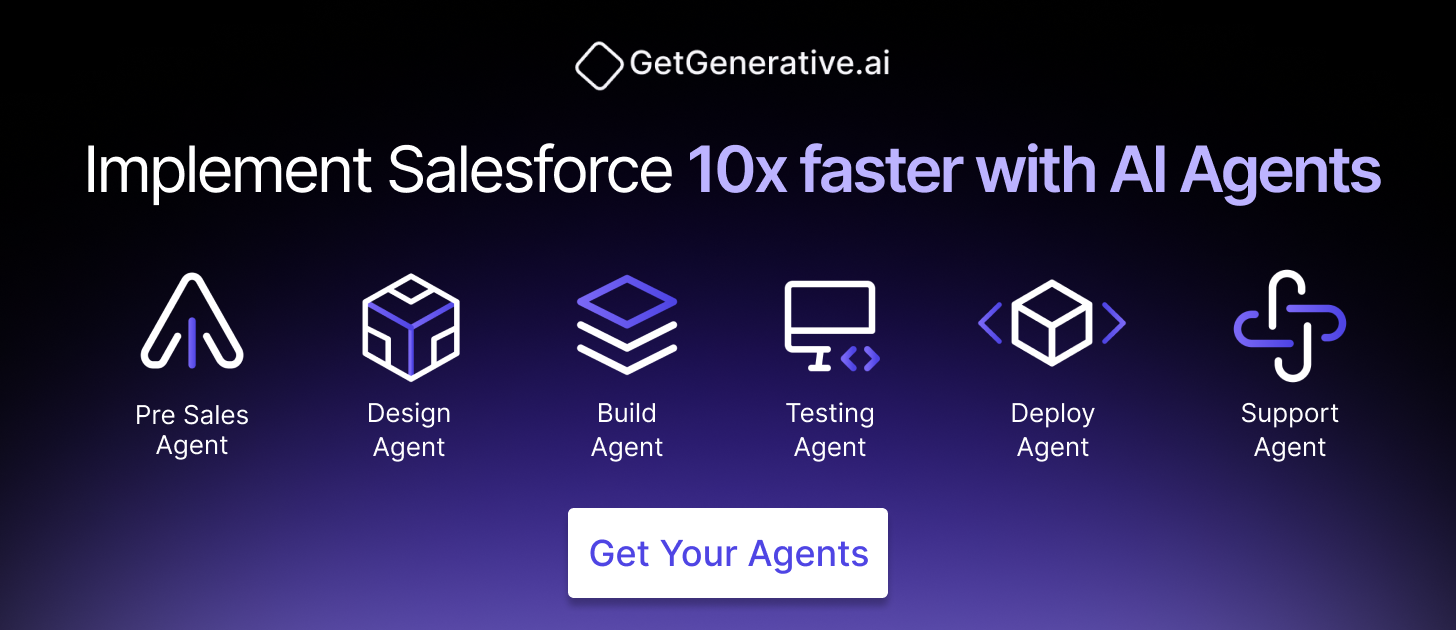Salesforce Einstein Language – Unlocking Advanced NLP Capabilities
According to Gartner, Inc., by 2026, conversational artificial intelligence (AI) deployments within contact centers will reduce agent labor costs by $80 billion, highlighting the growing importance of automated, AI-driven solutions like Salesforce Einstein Language.
This suite of natural language processing (NLP) APIs empowers businesses to analyze customer interactions at scale, extract meaningful insights, and enhance overall customer satisfaction and operational efficiency.
What is Salesforce Einstein Language?
Salesforce Einstein Language represents a breakthrough in CRM technology. It leverages artificial intelligence (AI) to process and analyze natural language text. Built natively into the Salesforce platform, Einstein Language offers a suite of powerful APIs designed to extract actionable insights from unstructured data sources such as emails, social media posts, chat transcripts, and customer surveys.
By integrating advanced natural language processing (NLP) capabilities, Einstein Language enables businesses to automate the analysis of customer sentiments, predict customer intentions, and categorize inquiries with unprecedented accuracy. This allows sales teams to prioritize leads based on sentiment trends, customer service departments to streamline issue resolution through intent classification, and marketing teams to personalize campaigns based on real-time customer feedback.
“Artificial intelligence and generative AI may be the most important technology of any lifetime.”
– Marc Benioff, Chair, CEO, and Co-Founder of Salesforce
Enhancing CRM through Advanced NLP
Customer Sentiment Analysis:
Salesforce Einstein Language empowers businesses to perform sentiment analysis on customer interactions across various channels, including emails, social media, and customer service interactions. This capability allows organizations to gauge customer satisfaction levels, identify emerging trends, and proactively address issues before they escalate.
Predictive Customer Insights:
By analyzing historical and real-time data, Einstein Language helps predict customer behaviors and preferences. This predictive capability enables sales teams to anticipate customer needs, tailor product recommendations, and strategize effective cross-selling or upselling opportunities.
Automated Intent Classification:
Einstein Language categorizes customer queries and requests into predefined labels such as sales inquiries, support tickets, or product feedback. This automation streamlines customer service workflows, ensuring prompt and accurate responses based on the nature and urgency of each inquiry.
Personalized Marketing Campaigns:
Leveraging NLP-powered insights, marketing teams can craft targeted campaigns that resonate with specific customer segments. By understanding customer sentiments and preferences, organizations can deliver personalized messaging, promotions, and content that drive engagement and conversion rates.
Operational Efficiency:
Integrating Einstein Language into CRM systems enhances operational efficiency by automating routine tasks such as data entry, lead scoring, and trend analysis. This allows teams to focus on strategic initiatives, improve productivity, and consistently deliver exceptional customer experiences.
Also Read – Salesforce Einstein Intent: A Comprehensive Guide
Exploring Einstein Language Components
Einstein Sentiment
Purpose and Functionality:
Einstein Sentiment analyzes text to determine whether it expresses positive, negative, or neutral sentiments. This functionality helps businesses understand customer emotions and perceptions across various communication channels.
Applications in CRM:
- Customer Feedback Analysis: This involves analyzing customer reviews, social media mentions, and survey responses to gauge overall sentiment toward products or services.
- Lead Scoring: Sentiment analysis is used to prioritize sales leads based on the sentiment expressed in emails or customer interactions.
- Brand Reputation Monitoring: Tracking sentiment trends to identify potential PR issues or opportunities for brand advocacy.
Einstein Intent
Purpose and Functionality:
Einstein Intent categorizes unstructured text into predefined labels or categories, such as purchase intent, support request, or general inquiry. This capability helps streamline customer service processes and improve response times.
Applications in CRM:
- Customer Support Automation: Automatically routing support tickets to the appropriate department or agent based on the intent expressed in customer queries.
- Sales Opportunity Identification: Identifying sales prospects and their specific needs by categorizing inquiries and requests from potential customers.
- Enhancing User Experience: Providing personalized recommendations or content based on the identified intent of customer interactions.
Einstein NER (Named Entity Recognition)
Purpose and Functionality:
Einstein NER identifies and extracts entities such as dates, locations, organizations, and more from unstructured text. This capability enhances data extraction and analysis within CRM systems.
Applications in CRM:
- Data Enrichment: Automatically extracting and categorizing key information from customer emails, documents, or forms to update CRM records.
- Compliance and Risk Management: Identifying sensitive information like personal data or financial details to ensure regulatory compliance and mitigate risks.
- Sales Intelligence: Recognizing key entities in sales conversations or proposals to facilitate accurate forecasting and decision-making.
Integration and Customization
Salesforce Ecosystem Integration:
Seamless integration with other Salesforce Clouds (e.g., Sales Cloud, Service Cloud) for unified data management and workflow automation.
Customization Options:
Ability to create custom models or workflows tailored to specific business needs, ensuring flexibility and scalability in NLP implementation.
Related Read – Top Salesforce AI Tools 2025 – The Ultimate List
Comparative Analysis
Einstein Language vs. IBM Watson NLP
Sentiment Analysis:
- Einstein Language: Offers robust sentiment analysis capabilities that categorize text into positive, negative, or neutral sentiments with high accuracy, leveraging Salesforce’s extensive customer data integration.
- IBM Watson NLP: Provides advanced sentiment analysis features with customizable models and deep learning algorithms, suitable for enterprises requiring highly tailored sentiment insights.
Intent Classification:
- Einstein Language: Automates intent classification to categorize customer queries and requests, optimizing CRM workflows within the Salesforce ecosystem.
- IBM Watson NLP: Offers flexible intent classification models that support complex user interactions and varied business applications, suitable for large-scale enterprise deployments.
Integration and Scalability:
- Einstein Language: Seamlessly integrates with Salesforce CRM products, ensuring data synchronization and unified user experience across sales, service, and marketing functions.
- IBM Watson NLP: Provides scalable deployment options across cloud and on-premises environments, supporting extensive integration capabilities with diverse enterprise systems.
Einstein Language vs. Google Cloud Natural Language
Entity Recognition:
- Einstein Language: Includes Einstein NER for identifying entities such as dates, locations, and organizations within the text, enhancing data extraction and analysis capabilities.
- Google Cloud Natural Language: Offers comprehensive entity recognition across multiple languages and supports a wide range of entity types, ideal for global enterprises with diverse linguistic requirements.
Also Read – How Einstein Email Insights Transforms Email Marketing with AI
Multilingual Support:
- Einstein Language: Supports multiple languages for sentiment analysis and intent classification, catering to global customer bases and multilingual CRM operations.
- Google Cloud Natural Language: Provides extensive multilingual support with pre-trained models and customizable language processing pipelines, facilitating cross-border communication and localization efforts.
Accuracy and Performance:
- Einstein Language: It is optimized for CRM-specific use cases and delivers high accuracy in sentiment analysis and intent classification within Salesforce environments.
- Google Cloud Natural Language: Known for its robust performance in handling large-scale data processing tasks and real-time text analysis, suitable for complex enterprise applications.
Conclusion
Salesforce Einstein Language represents a paradigm shift in businesses leveraging AI-driven NLP to transform CRM capabilities. Einstein Language enables proactive customer engagement and data-driven decision-making by empowering organizations to analyze customer sentiments, predict behaviors, and automate workflows. As NLP technology evolves, integrating Einstein Language into CRM strategies promises to unlock new customer insight and operational efficiency levels, propelling businesses towards sustained growth and competitive advantage.
Use GetGenerative.ai to make your consulting process easier. Effortlessly create great proposals and focus more on providing excellent service to your clients.
Start today and change how you work.
Frequently Asked Questions (FAQs)
1. How do I get started with Salesforce Einstein Language APIs?
Getting started with Einstein Language APIs is straightforward within the Salesforce ecosystem. Developers can access comprehensive documentation and sample codes on Salesforce Trailhead to learn how to integrate and customize Einstein Language for specific business needs.
2. Is training required to use Einstein Sentiment and Intent?
While familiarity with NLP concepts is beneficial, Salesforce Einstein Language offers pre-built models that simplify implementation. Businesses can start using Einstein Sentiment and Intent APIs with minimal training, leveraging Salesforce’s intuitive platform for seamless integration and rapid deployment.
3. Can Einstein Language be integrated with other Salesforce products?
Yes, Einstein Language integrates with other Salesforce Clouds, such as Sales Cloud, Service Cloud, and Marketing Cloud. This integration facilitates unified data management, cross-functional collaboration, and comprehensive customer insights across the Salesforce ecosystem.




